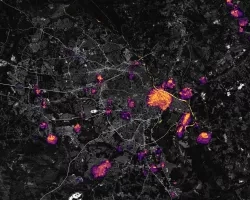The Disasters program area of NASA’s Earth Applied Sciences Program has joined the Anticipation Hub, an online knowledge and exchange platform that aims to catalyze anticipatory action in the humanitarian sector to reduce disaster risk and aid adaptation to climate change. The hub, which was launched in December 2020 at the Global Dialogue Platform on Anticipatory Humanitarian Action, already includes organizations from more than 60 countries worldwide. By adding unique perspectives from Earth-observing instruments operating within and above Earth’s atmosphere, NASA’s participation will facilitate innovation and help illustrate how Earth is a complex system that is affected by land use, human activities, social and economic context, as well as weather, water and climate phenomenon.
Along with the diverse range of participants across the International Red Cross and Red Crescent Movement, the Anticipation Hub includes universities, research institutes, United Nations agencies, non-governmental organizations (NGOs), networks/platforms and governmental bodies from national to global levels. These organizations are coming together to assist in coordination of early action at the global, regional and local level.
The Anticipation Hub has three strategic priorities:
-
Stimulate learning, innovation and exchange between those who develop and apply tools, methodologies and evidence related to anticipatory action.
-
Provide guidance and support - connecting different specialists and users to identify solutions.
-
Promote lasting change through sustained policy and advocacy efforts to speed and scale anticipatory approaches – making them mainstream within development and humanitarian systems.
Participation in the Anticipation Hub aligns with the NASA Disasters Program’s goals to promote the use and utility of Earth observations and applied research results for disaster risk reduction and to develop sustainable disaster resilience in vulnerable communities. By targeting resources and key collaborations, NASA is providing actionable insights from data analysis, enhanced situational awareness and "environmental intelligence" from information products to support decisions. Environmental intelligence addresses the question “what’s next?” by enabling anticipation or prediction of future situations to inform choice by revealing the options to support decisions and guide available courses of action.
“The knowledge and intelligence shared through this global network will complement early warning with deeper understanding of potential perils and incentives for timely interventions to reduce exposure, mitigate vulnerability and strengthen coping capacity,” said David Green, program manager for the NASA Disasters Program. “This increased awareness and predictive action will ultimately enable communities to move from ‘reaction’ to science-informed ‘anticipation’ - an approach which helps communities thrive by reducing risk and developing resilience to prevent natural hazards from becoming disasters.”
For more information about the Anticipation Hub, visit https://www.anticipation-hub.org



